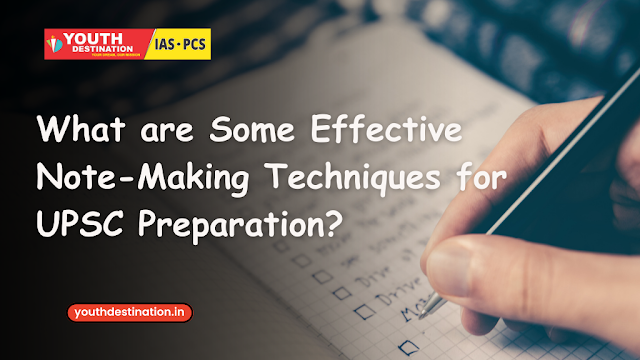In this article, we
will explore some effective note-making techniques specifically tailored for
UPSC preparation. Whether you are a beginner or an experienced aspirant, these
techniques will assist you in capturing and reviewing key concepts, facts, and
ideas efficiently. Are you preparing for the UPSC (Union Public Service
Commission) exams and finding it challenging to organize and retain vast
amounts of information? Note-making is a crucial skill that can significantly
enhance your preparation and help you excel in the exams.
Effective note-making
is an essential component of UPSC preparation. It involves actively engaging
with the study material, organizing information in a structured manner, and
creating personalized mnemonic devices to aid retention. By adopting appropriate
note-making techniques, you can enhance your understanding, recall, and
critical analysis of the subjects covered in the UPSC syllabus.
1. Note-Making for
UPSC Preparation
Taking notes during
your study sessions serves multiple purposes. Firstly, it helps in
consolidating and reinforcing your learning by forcing you to actively process
information. Additionally, well-organized notes act as a valuable resource for
quick revision, allowing you to review important concepts and facts
efficiently. Moreover, the act of note-making facilitates the identification of
patterns, connections, and recurring themes across different topics, enabling a
deeper understanding of the subject matter.
2. Selecting the Right
Tools for Note-Making
Choosing the
appropriate tools for note-making is crucial to streamline the process and
maximize productivity. While some aspirants prefer traditional pen and paper,
others find digital note-taking apps or software more convenient. Experiment
with different options and identify the method that suits your learning style
and preferences. It is essential to select tools that allow easy organization,
searchability, and accessibility to your notes.
3. Active Reading and
Annotation Techniques
Active reading goes
hand in hand with effective note-making. As you read through study materials,
actively engage with the content by highlighting key points, underlining
important information, and jotting down brief summaries or questions in the
margins. Annotation techniques like using symbols, colors, and abbreviations
can help you quickly identify and comprehend essential details during revision.
4. Structuring Your
Notes: Mind Maps and Diagrams
Mind maps and diagrams
are powerful visual tools that aid in structuring and organizing complex
information. They allow you to visually represent relationships between
different topics, making it easier to grasp the overall picture. Start with a
central theme or concept and branch out to subtopics, using colors, keywords,
and arrows to connect related ideas. Mind maps can be particularly helpful in
subjects like history, geography, and polity.
5. Creating
Abbreviations and Mnemonics
The UPSC syllabus
covers a vast range of subjects and topics, often requiring you to remember
extensive factual information. Creating abbreviations, acronyms, and mnemonics
can significantly assist in retaining and recalling such details. Develop a
personalized system of abbreviations that are easy for you to remember and
understand. For example, you can use acronyms to remember key dates or events,
or create mnemonic phrases that help you associate certain facts or concepts
with memorable phrases or sentences.
6. Summarizing and
Condensing Information
One of the challenges
in UPSC preparation is dealing with the vast amount of information. Effective
note-making involves the skill of summarizing and condensing complex ideas into
concise and meaningful points. Practice extracting the main ideas, key
arguments, and supporting evidence from your study materials and present them
in a clear and organized manner. This will not only save you time during
revision but also enhance your understanding of the subject matter.
7. Reviewing and
Revising Your Notes Regularly
Consistent review and
revision of your notes are crucial for retaining information in the long term.
Set aside dedicated time for regular review sessions where you revisit and
reinforce the concepts you have learned. This helps in strengthening your memory,
identifying any knowledge gaps, and reinforcing your understanding of the
topics.
8. Integrating
Multiple Sources and Perspectives
UPSC exams require a
comprehensive understanding of various subjects and the ability to critically
analyze different perspectives. When making notes, incorporate information from
multiple sources to gain a well-rounded understanding of the topic. Compare and
contrast different viewpoints, and highlight any contradictions or debates
within the subject matter. This will help you develop a nuanced and holistic
approach to your studies.
9. Utilizing
Technology for Note-Making
In the digital age,
technology offers a wide range of tools and resources that can enhance your
note-making process. Consider using note-taking apps, such as Evernote or
Microsoft OneNote, which allow you to organize, search, and access your notes
across different devices. You can also explore online research databases,
e-books, and educational websites to supplement your study materials and gather
relevant information for your notes.
10. Developing
Personalized Note-Making Strategies
While there are
general guidelines for effective note-making, it's important to develop
personalized strategies that align with your learning style and preferences.
Experiment with different techniques, formats, and structures to find what
works best for you. Some individuals may prefer visual aids like charts and
graphs, while others may benefit from detailed outlines or bullet-point
summaries. Tailor your note-making approach to optimize your understanding and
retention of the material.
Conclusion
Effective note-making
is an invaluable skill for UPSC aspirants. By employing the right techniques,
tools, and strategies, you can enhance your preparation and improve your
chances of success in the exams. Remember to actively engage with the study
material, structure your notes in a clear and organized manner, and regularly
review and revise your notes to reinforce your learning. With consistent
practice and dedication, you can master the art of note-making and excel in
your UPSC journey. Click for more about Best IAS Coaching in Delhi.
Best of luck on your
UPSC journey!



.png)
















0 Comments